Health Care Ethics: Principlism, Dignity, Violence, and HCP Rights
VerifiedAdded on 2022/08/21
|7
|1563
|9
Discussion Board Post
AI Summary
This discussion post delves into the realm of health care ethics, focusing on the theory of principlism and its four core principles: autonomy, beneficence, non-maleficence, and justice. The paper explores the application of these principles in the context of health care professionals (HCPs) and the importance of human dignity. It examines how ethical considerations play a crucial role in situations of adversity, such as workplace violence, where the HCP's right to self-respect and safety is paramount. The post argues that while these principles primarily benefit patients, they should also be applied to protect HCPs from violence, thereby validating their right to refuse treatment in such cases. The discussion references relevant literature and legal frameworks, including the Workplace Violence Prevention for Health Care and Social Service Workers Act, to support the conclusion that HCPs' rights and well-being should be prioritized in ethical and legal considerations. It also highlights the importance of respecting human rights and maintaining a safe work environment for all healthcare professionals.
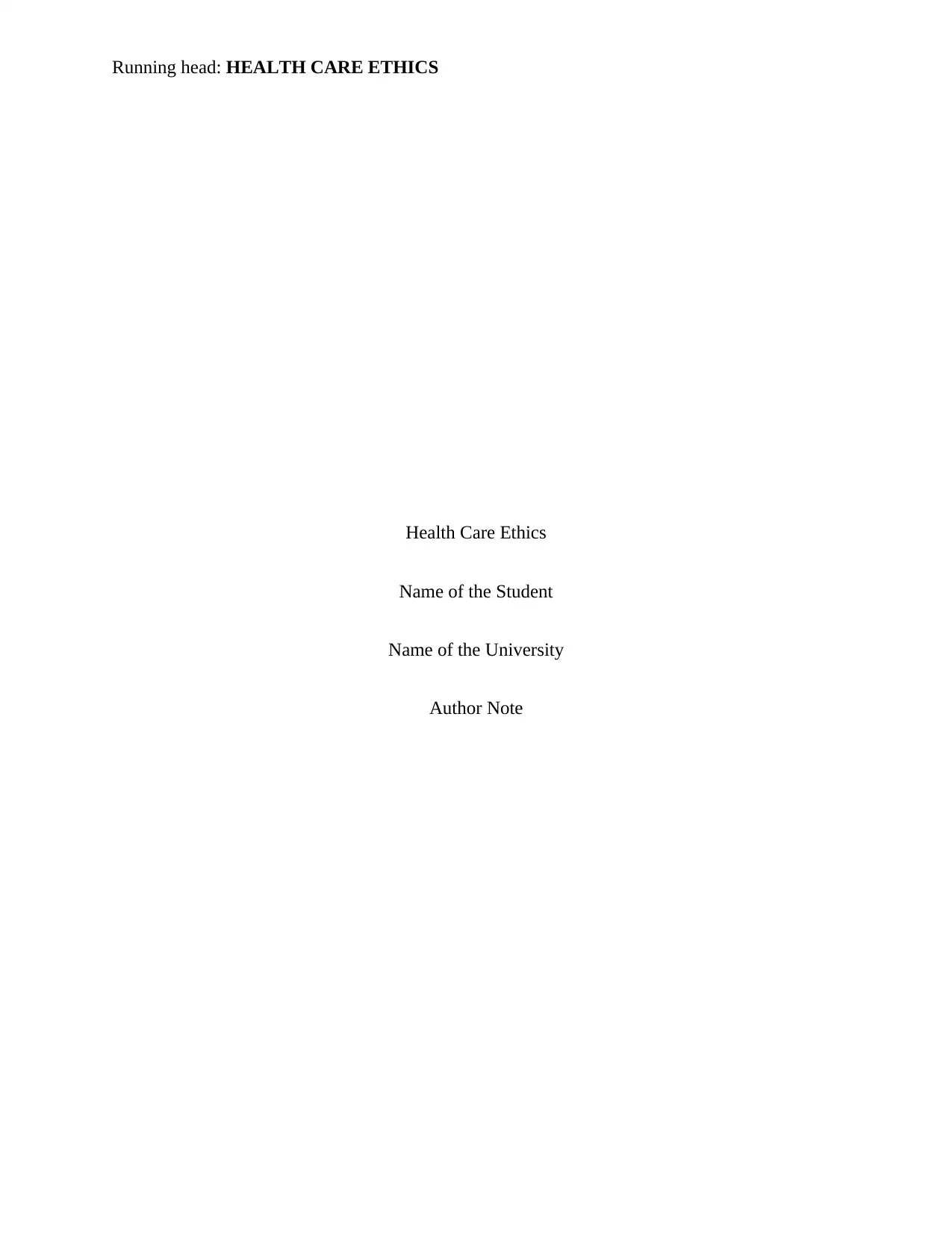
Running head: HEALTH CARE ETHICS
Health Care Ethics
Name of the Student
Name of the University
Author Note
Health Care Ethics
Name of the Student
Name of the University
Author Note
Paraphrase This Document
Need a fresh take? Get an instant paraphrase of this document with our AI Paraphraser
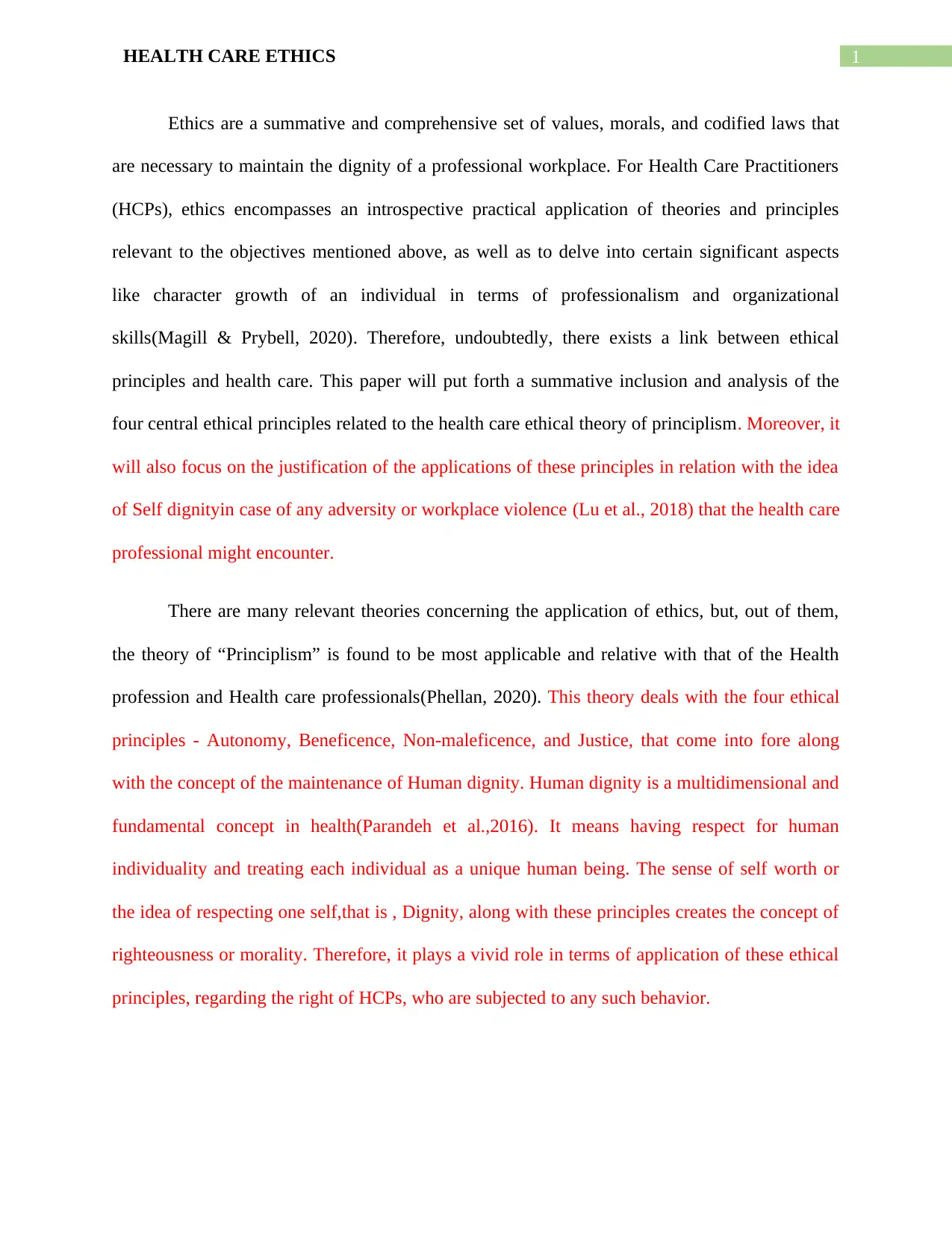
1HEALTH CARE ETHICS
Ethics are a summative and comprehensive set of values, morals, and codified laws that
are necessary to maintain the dignity of a professional workplace. For Health Care Practitioners
(HCPs), ethics encompasses an introspective practical application of theories and principles
relevant to the objectives mentioned above, as well as to delve into certain significant aspects
like character growth of an individual in terms of professionalism and organizational
skills(Magill & Prybell, 2020). Therefore, undoubtedly, there exists a link between ethical
principles and health care. This paper will put forth a summative inclusion and analysis of the
four central ethical principles related to the health care ethical theory of principlism. Moreover, it
will also focus on the justification of the applications of these principles in relation with the idea
of Self dignityin case of any adversity or workplace violence (Lu et al., 2018) that the health care
professional might encounter.
There are many relevant theories concerning the application of ethics, but, out of them,
the theory of “Principlism” is found to be most applicable and relative with that of the Health
profession and Health care professionals(Phellan, 2020). This theory deals with the four ethical
principles - Autonomy, Beneficence, Non-maleficence, and Justice, that come into fore along
with the concept of the maintenance of Human dignity. Human dignity is a multidimensional and
fundamental concept in health(Parandeh et al.,2016). It means having respect for human
individuality and treating each individual as a unique human being. The sense of self worth or
the idea of respecting one self,that is , Dignity, along with these principles creates the concept of
righteousness or morality. Therefore, it plays a vivid role in terms of application of these ethical
principles, regarding the right of HCPs, who are subjected to any such behavior.
Ethics are a summative and comprehensive set of values, morals, and codified laws that
are necessary to maintain the dignity of a professional workplace. For Health Care Practitioners
(HCPs), ethics encompasses an introspective practical application of theories and principles
relevant to the objectives mentioned above, as well as to delve into certain significant aspects
like character growth of an individual in terms of professionalism and organizational
skills(Magill & Prybell, 2020). Therefore, undoubtedly, there exists a link between ethical
principles and health care. This paper will put forth a summative inclusion and analysis of the
four central ethical principles related to the health care ethical theory of principlism. Moreover, it
will also focus on the justification of the applications of these principles in relation with the idea
of Self dignityin case of any adversity or workplace violence (Lu et al., 2018) that the health care
professional might encounter.
There are many relevant theories concerning the application of ethics, but, out of them,
the theory of “Principlism” is found to be most applicable and relative with that of the Health
profession and Health care professionals(Phellan, 2020). This theory deals with the four ethical
principles - Autonomy, Beneficence, Non-maleficence, and Justice, that come into fore along
with the concept of the maintenance of Human dignity. Human dignity is a multidimensional and
fundamental concept in health(Parandeh et al.,2016). It means having respect for human
individuality and treating each individual as a unique human being. The sense of self worth or
the idea of respecting one self,that is , Dignity, along with these principles creates the concept of
righteousness or morality. Therefore, it plays a vivid role in terms of application of these ethical
principles, regarding the right of HCPs, who are subjected to any such behavior.
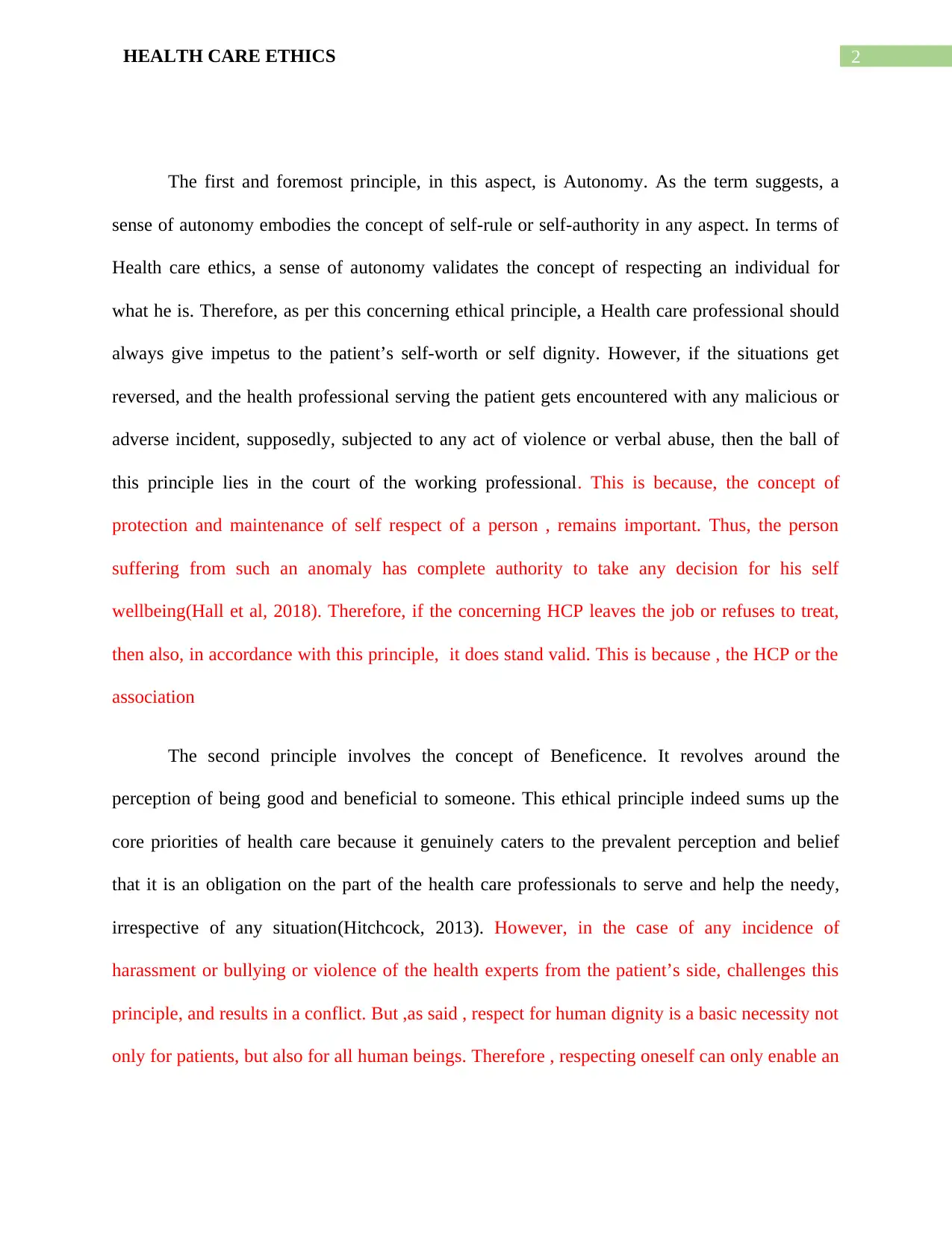
2HEALTH CARE ETHICS
The first and foremost principle, in this aspect, is Autonomy. As the term suggests, a
sense of autonomy embodies the concept of self-rule or self-authority in any aspect. In terms of
Health care ethics, a sense of autonomy validates the concept of respecting an individual for
what he is. Therefore, as per this concerning ethical principle, a Health care professional should
always give impetus to the patient’s self-worth or self dignity. However, if the situations get
reversed, and the health professional serving the patient gets encountered with any malicious or
adverse incident, supposedly, subjected to any act of violence or verbal abuse, then the ball of
this principle lies in the court of the working professional. This is because, the concept of
protection and maintenance of self respect of a person , remains important. Thus, the person
suffering from such an anomaly has complete authority to take any decision for his self
wellbeing(Hall et al, 2018). Therefore, if the concerning HCP leaves the job or refuses to treat,
then also, in accordance with this principle, it does stand valid. This is because , the HCP or the
association
The second principle involves the concept of Beneficence. It revolves around the
perception of being good and beneficial to someone. This ethical principle indeed sums up the
core priorities of health care because it genuinely caters to the prevalent perception and belief
that it is an obligation on the part of the health care professionals to serve and help the needy,
irrespective of any situation(Hitchcock, 2013). However, in the case of any incidence of
harassment or bullying or violence of the health experts from the patient’s side, challenges this
principle, and results in a conflict. But ,as said , respect for human dignity is a basic necessity not
only for patients, but also for all human beings. Therefore , respecting oneself can only enable an
The first and foremost principle, in this aspect, is Autonomy. As the term suggests, a
sense of autonomy embodies the concept of self-rule or self-authority in any aspect. In terms of
Health care ethics, a sense of autonomy validates the concept of respecting an individual for
what he is. Therefore, as per this concerning ethical principle, a Health care professional should
always give impetus to the patient’s self-worth or self dignity. However, if the situations get
reversed, and the health professional serving the patient gets encountered with any malicious or
adverse incident, supposedly, subjected to any act of violence or verbal abuse, then the ball of
this principle lies in the court of the working professional. This is because, the concept of
protection and maintenance of self respect of a person , remains important. Thus, the person
suffering from such an anomaly has complete authority to take any decision for his self
wellbeing(Hall et al, 2018). Therefore, if the concerning HCP leaves the job or refuses to treat,
then also, in accordance with this principle, it does stand valid. This is because , the HCP or the
association
The second principle involves the concept of Beneficence. It revolves around the
perception of being good and beneficial to someone. This ethical principle indeed sums up the
core priorities of health care because it genuinely caters to the prevalent perception and belief
that it is an obligation on the part of the health care professionals to serve and help the needy,
irrespective of any situation(Hitchcock, 2013). However, in the case of any incidence of
harassment or bullying or violence of the health experts from the patient’s side, challenges this
principle, and results in a conflict. But ,as said , respect for human dignity is a basic necessity not
only for patients, but also for all human beings. Therefore , respecting oneself can only enable an
⊘ This is a preview!⊘
Do you want full access?
Subscribe today to unlock all pages.

Trusted by 1+ million students worldwide
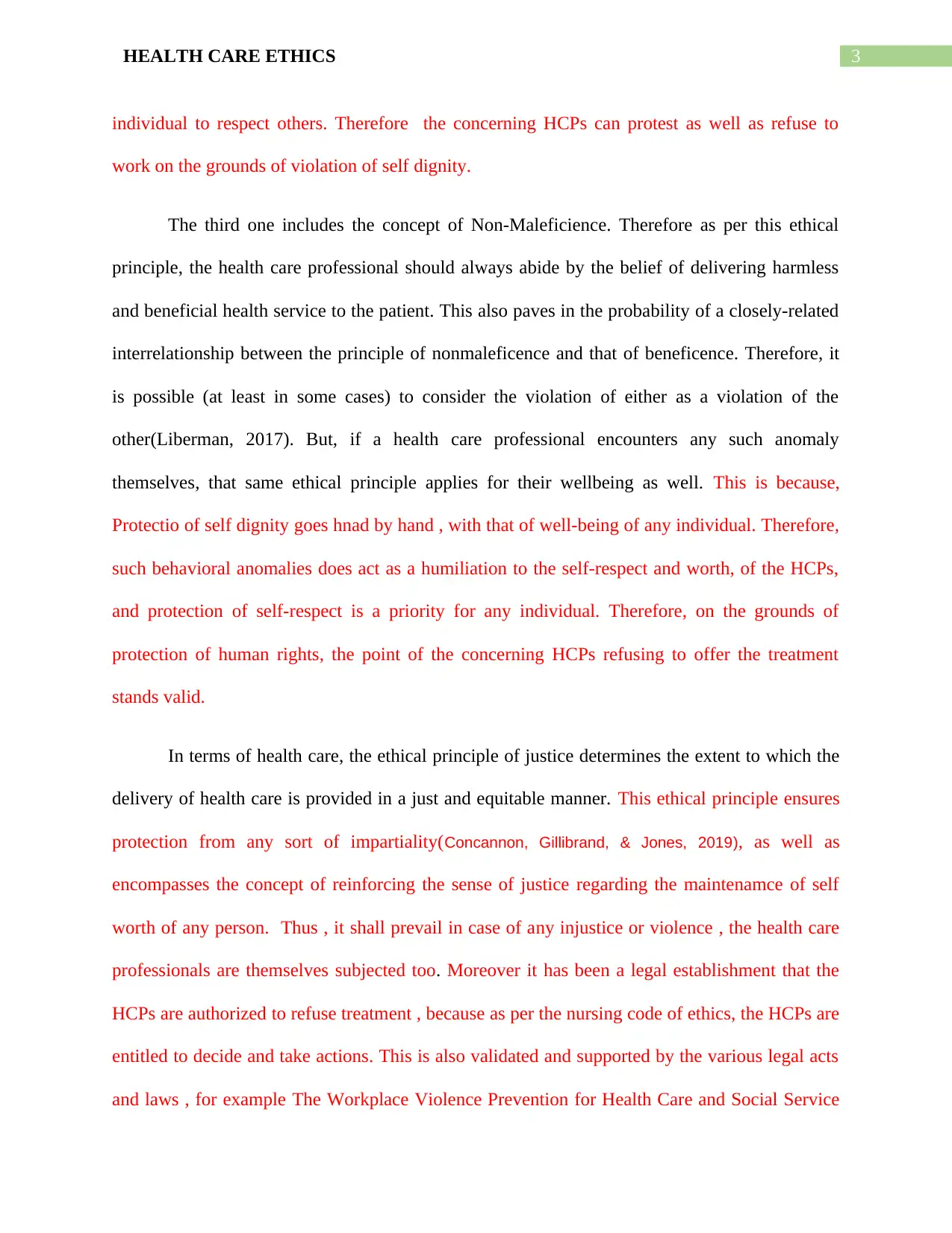
3HEALTH CARE ETHICS
individual to respect others. Therefore the concerning HCPs can protest as well as refuse to
work on the grounds of violation of self dignity.
The third one includes the concept of Non-Maleficience. Therefore as per this ethical
principle, the health care professional should always abide by the belief of delivering harmless
and beneficial health service to the patient. This also paves in the probability of a closely-related
interrelationship between the principle of nonmaleficence and that of beneficence. Therefore, it
is possible (at least in some cases) to consider the violation of either as a violation of the
other(Liberman, 2017). But, if a health care professional encounters any such anomaly
themselves, that same ethical principle applies for their wellbeing as well. This is because,
Protectio of self dignity goes hnad by hand , with that of well-being of any individual. Therefore,
such behavioral anomalies does act as a humiliation to the self-respect and worth, of the HCPs,
and protection of self-respect is a priority for any individual. Therefore, on the grounds of
protection of human rights, the point of the concerning HCPs refusing to offer the treatment
stands valid.
In terms of health care, the ethical principle of justice determines the extent to which the
delivery of health care is provided in a just and equitable manner. This ethical principle ensures
protection from any sort of impartiality(Concannon, Gillibrand, & Jones, 2019), as well as
encompasses the concept of reinforcing the sense of justice regarding the maintenamce of self
worth of any person. Thus , it shall prevail in case of any injustice or violence , the health care
professionals are themselves subjected too. Moreover it has been a legal establishment that the
HCPs are authorized to refuse treatment , because as per the nursing code of ethics, the HCPs are
entitled to decide and take actions. This is also validated and supported by the various legal acts
and laws , for example The Workplace Violence Prevention for Health Care and Social Service
individual to respect others. Therefore the concerning HCPs can protest as well as refuse to
work on the grounds of violation of self dignity.
The third one includes the concept of Non-Maleficience. Therefore as per this ethical
principle, the health care professional should always abide by the belief of delivering harmless
and beneficial health service to the patient. This also paves in the probability of a closely-related
interrelationship between the principle of nonmaleficence and that of beneficence. Therefore, it
is possible (at least in some cases) to consider the violation of either as a violation of the
other(Liberman, 2017). But, if a health care professional encounters any such anomaly
themselves, that same ethical principle applies for their wellbeing as well. This is because,
Protectio of self dignity goes hnad by hand , with that of well-being of any individual. Therefore,
such behavioral anomalies does act as a humiliation to the self-respect and worth, of the HCPs,
and protection of self-respect is a priority for any individual. Therefore, on the grounds of
protection of human rights, the point of the concerning HCPs refusing to offer the treatment
stands valid.
In terms of health care, the ethical principle of justice determines the extent to which the
delivery of health care is provided in a just and equitable manner. This ethical principle ensures
protection from any sort of impartiality(Concannon, Gillibrand, & Jones, 2019), as well as
encompasses the concept of reinforcing the sense of justice regarding the maintenamce of self
worth of any person. Thus , it shall prevail in case of any injustice or violence , the health care
professionals are themselves subjected too. Moreover it has been a legal establishment that the
HCPs are authorized to refuse treatment , because as per the nursing code of ethics, the HCPs are
entitled to decide and take actions. This is also validated and supported by the various legal acts
and laws , for example The Workplace Violence Prevention for Health Care and Social Service
Paraphrase This Document
Need a fresh take? Get an instant paraphrase of this document with our AI Paraphraser
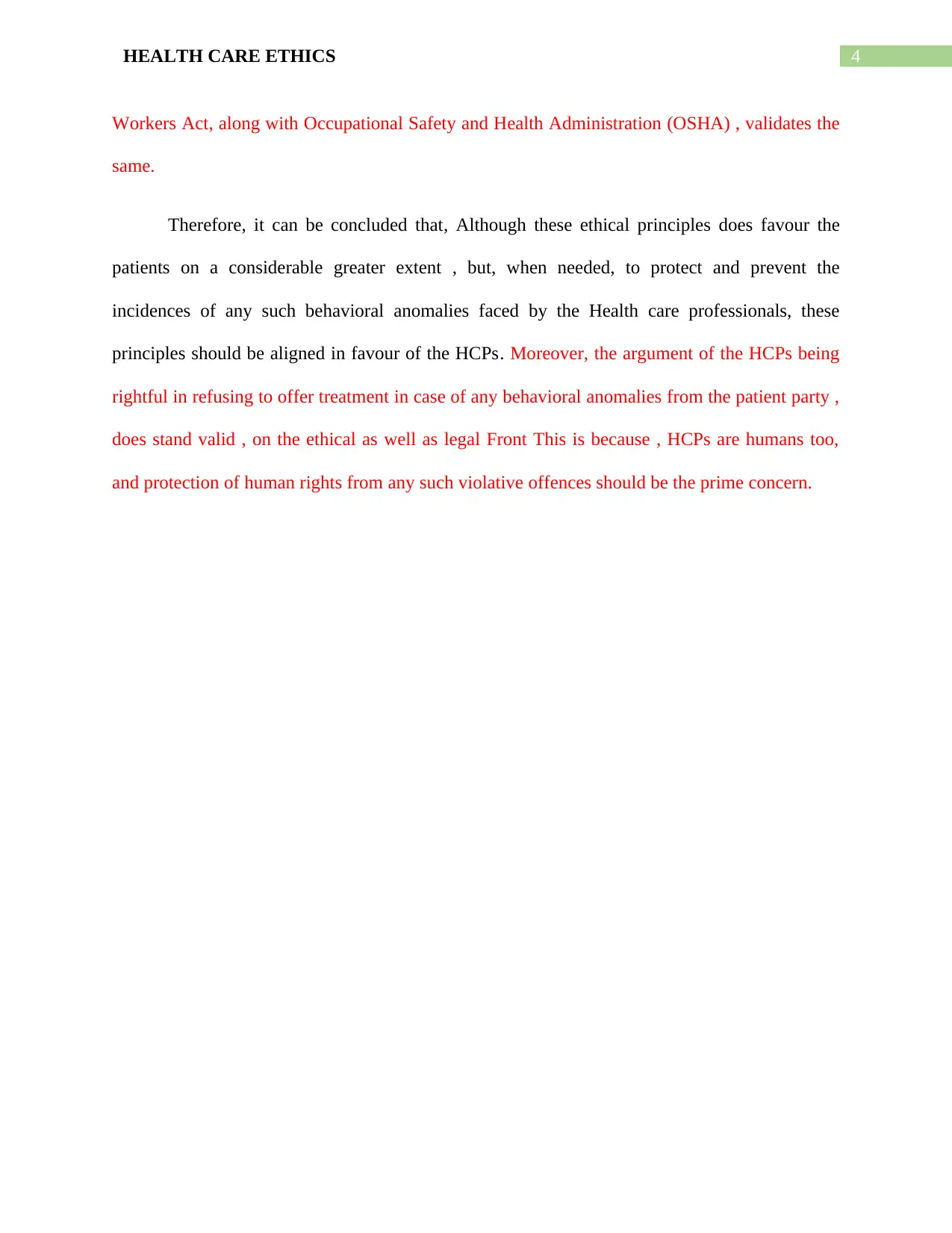
4HEALTH CARE ETHICS
Workers Act, along with Occupational Safety and Health Administration (OSHA) , validates the
same.
Therefore, it can be concluded that, Although these ethical principles does favour the
patients on a considerable greater extent , but, when needed, to protect and prevent the
incidences of any such behavioral anomalies faced by the Health care professionals, these
principles should be aligned in favour of the HCPs. Moreover, the argument of the HCPs being
rightful in refusing to offer treatment in case of any behavioral anomalies from the patient party ,
does stand valid , on the ethical as well as legal Front This is because , HCPs are humans too,
and protection of human rights from any such violative offences should be the prime concern.
Workers Act, along with Occupational Safety and Health Administration (OSHA) , validates the
same.
Therefore, it can be concluded that, Although these ethical principles does favour the
patients on a considerable greater extent , but, when needed, to protect and prevent the
incidences of any such behavioral anomalies faced by the Health care professionals, these
principles should be aligned in favour of the HCPs. Moreover, the argument of the HCPs being
rightful in refusing to offer treatment in case of any behavioral anomalies from the patient party ,
does stand valid , on the ethical as well as legal Front This is because , HCPs are humans too,
and protection of human rights from any such violative offences should be the prime concern.
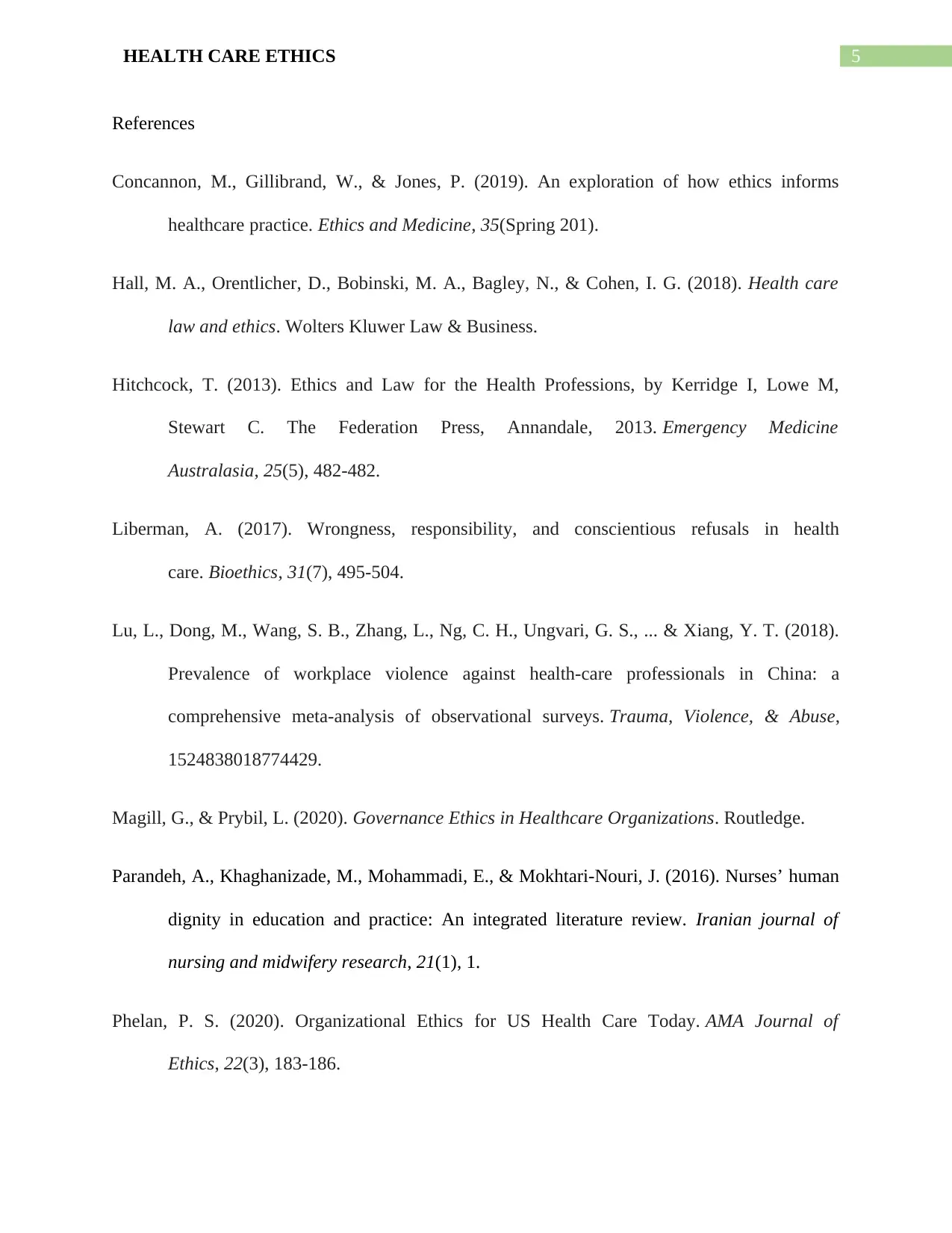
5HEALTH CARE ETHICS
References
Concannon, M., Gillibrand, W., & Jones, P. (2019). An exploration of how ethics informs
healthcare practice. Ethics and Medicine, 35(Spring 201).
Hall, M. A., Orentlicher, D., Bobinski, M. A., Bagley, N., & Cohen, I. G. (2018). Health care
law and ethics. Wolters Kluwer Law & Business.
Hitchcock, T. (2013). Ethics and Law for the Health Professions, by Kerridge I, Lowe M,
Stewart C. The Federation Press, Annandale, 2013. Emergency Medicine
Australasia, 25(5), 482-482.
Liberman, A. (2017). Wrongness, responsibility, and conscientious refusals in health
care. Bioethics, 31(7), 495-504.
Lu, L., Dong, M., Wang, S. B., Zhang, L., Ng, C. H., Ungvari, G. S., ... & Xiang, Y. T. (2018).
Prevalence of workplace violence against health-care professionals in China: a
comprehensive meta-analysis of observational surveys. Trauma, Violence, & Abuse,
1524838018774429.
Magill, G., & Prybil, L. (2020). Governance Ethics in Healthcare Organizations. Routledge.
Parandeh, A., Khaghanizade, M., Mohammadi, E., & Mokhtari-Nouri, J. (2016). Nurses’ human
dignity in education and practice: An integrated literature review. Iranian journal of
nursing and midwifery research, 21(1), 1.
Phelan, P. S. (2020). Organizational Ethics for US Health Care Today. AMA Journal of
Ethics, 22(3), 183-186.
References
Concannon, M., Gillibrand, W., & Jones, P. (2019). An exploration of how ethics informs
healthcare practice. Ethics and Medicine, 35(Spring 201).
Hall, M. A., Orentlicher, D., Bobinski, M. A., Bagley, N., & Cohen, I. G. (2018). Health care
law and ethics. Wolters Kluwer Law & Business.
Hitchcock, T. (2013). Ethics and Law for the Health Professions, by Kerridge I, Lowe M,
Stewart C. The Federation Press, Annandale, 2013. Emergency Medicine
Australasia, 25(5), 482-482.
Liberman, A. (2017). Wrongness, responsibility, and conscientious refusals in health
care. Bioethics, 31(7), 495-504.
Lu, L., Dong, M., Wang, S. B., Zhang, L., Ng, C. H., Ungvari, G. S., ... & Xiang, Y. T. (2018).
Prevalence of workplace violence against health-care professionals in China: a
comprehensive meta-analysis of observational surveys. Trauma, Violence, & Abuse,
1524838018774429.
Magill, G., & Prybil, L. (2020). Governance Ethics in Healthcare Organizations. Routledge.
Parandeh, A., Khaghanizade, M., Mohammadi, E., & Mokhtari-Nouri, J. (2016). Nurses’ human
dignity in education and practice: An integrated literature review. Iranian journal of
nursing and midwifery research, 21(1), 1.
Phelan, P. S. (2020). Organizational Ethics for US Health Care Today. AMA Journal of
Ethics, 22(3), 183-186.
⊘ This is a preview!⊘
Do you want full access?
Subscribe today to unlock all pages.

Trusted by 1+ million students worldwide
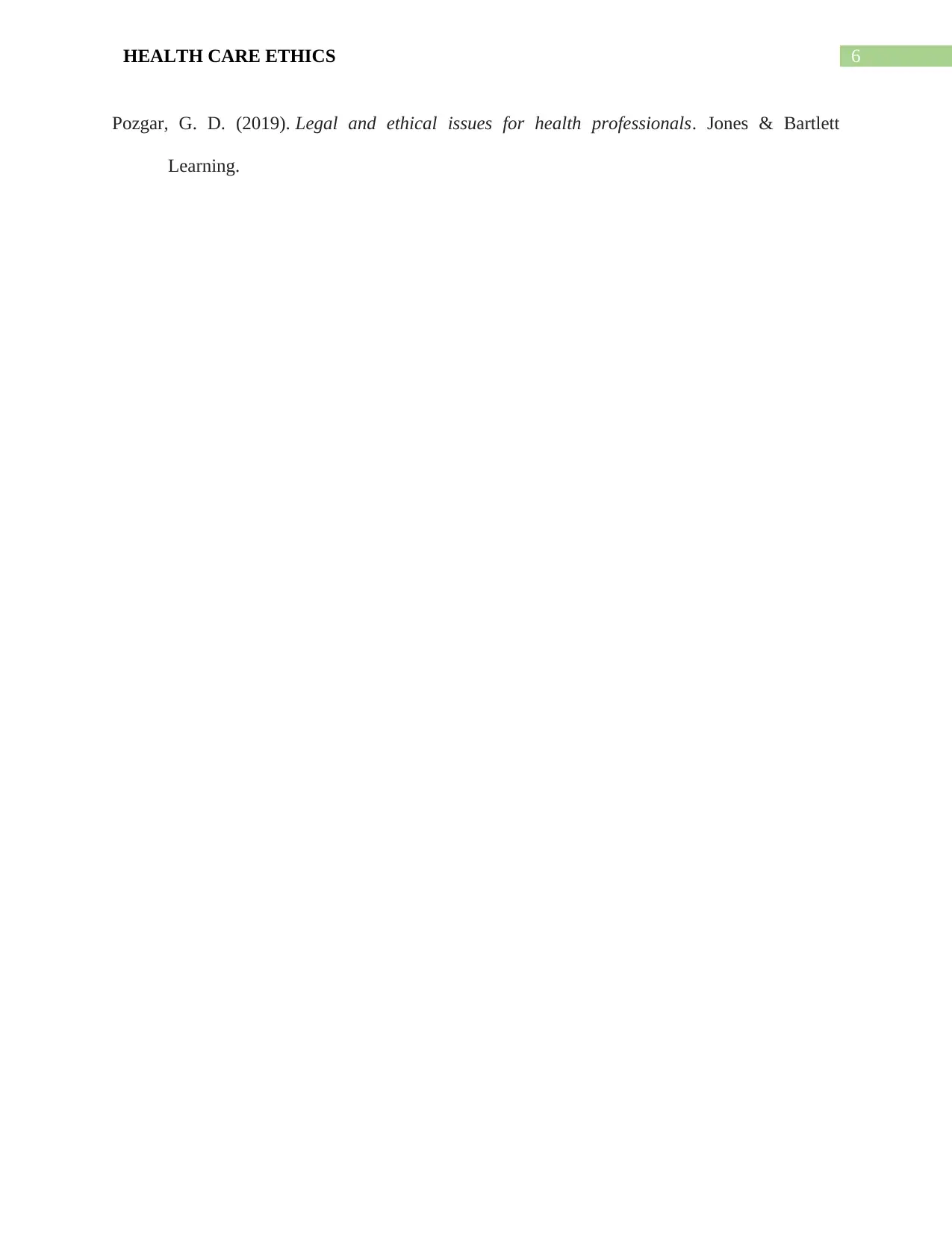
6HEALTH CARE ETHICS
Pozgar, G. D. (2019). Legal and ethical issues for health professionals. Jones & Bartlett
Learning.
Pozgar, G. D. (2019). Legal and ethical issues for health professionals. Jones & Bartlett
Learning.
1 out of 7
Related Documents
Your All-in-One AI-Powered Toolkit for Academic Success.
+13062052269
info@desklib.com
Available 24*7 on WhatsApp / Email
![[object Object]](/_next/static/media/star-bottom.7253800d.svg)
Unlock your academic potential
Copyright © 2020–2026 A2Z Services. All Rights Reserved. Developed and managed by ZUCOL.





